2013 年 12 月英语四级真题(第二套)
Part Ⅰ
Writing
(30 minutes)
Directions:Forthispart,youareallowed30minutestowriteashortessaybased
on the picture below. You should start your essay with a brief account
of the increasing use of the mobile phone in people’s life and then
explaintheconsequencesofoverusingit.Youshouldwriteatleast120
words but no more than, 180 words.
Part Ⅱ
Section A
Listening Comprehension
(30 minutes)
Directions: In this section, you will hear 8 short conversations and 2 long
conversations. At the end of each conversation, one or more questions
willbeaskedaboutwhatwassaid.Boththeconversationandthequestions
willbespokenonlyonce.Aftereachquestiontherewillbeapause.During
thepause, youmustreadthefourchoicesmarkedA),B),C)andD),and
decide which is the best answer. Then mark the corresponding letter on
Answer Sheet I with a single line through the centre.
1. A) Go to a place he has visited.
B) Make her own arrangements.
C) Consult a travel agent.
D) Join in a package tour.
2. A) They are on a long trip by car.
B) They are stuck in a traffic jam.
C) They are used to getting up early.
D) They are tired of eating out at night.
3. A) He is a person difficult to deal with.
B) He dislikes any formal gathering.
C) He is unwilling to speak in public.
�
D) He often keeps a distance from others.
4. A) Work in another department.
B) Pursue further education.
C) Recruit graduate students.
D) Take an administrative job.
5. A) He would not be available to start the job in time.
B) He is not quite qualified for the art director position.
C) He would like to leave some more time for himself.
D) He will get his application letter ready before May 1.
6. A) Cleaner.
B) Mechanic.
C) Porter.
D) Salesman.
7. A) Request one or two roommates to do the cleaning.
B) Help Laura with her term paper due this weekend.
C) Get Laura to clean the apartment herself this time.
D) Ask Laura to put off the cleaning until another week.
8. A) A problem caused by the construction.
B) An accident that occurred on the bridge.
C) The building project they are working on.
D) The public transportation conditions.
Questions 9 to 11 are based on the conversation you have just heard.
9. A) To look for a job as a salesperson.
B) To have a talk with Miss Thompson.
C) To place an order for some products.
D) To complain about a faulty appliance.
10. A) The person in charge is not in the office.
B) The supplies are out of stock for the moment.
C) They failed to reach an agreement on the price.
D) The company is re-cataloguing the items.
11. A) 0743, 12536 extension 15.
B) 0734, 21653 extension 51.
C) 0734, 38750 extension 15.
D) 0743, 62135 extension 51.
Questions 12 to 15 are based on the conversation you have just heard.
�
12. A) Since he found a girlfriend.
B) Since he took to heavy smoking.
C) Since he began to exercise regularly.
D) Since he started to live on his own.
13. A) He is getting too fat.
B) He smokes too much.
C) He doesn’t eat vegetables.
D) He doesn’t look well at all.
14. A) They are overweight for their age.
B) They are respectful to their parents.
C) They are still in their early twenties.
D) They dislike doing physical exercise.
15. A) To quit smoking.
B) To reduce his weight.
C) To find a girlfriend.
D) To follow her advice.
Section B
Directions: In this section, you will hear 3 short passages. At the end of each
passage,youwillhearsomequestions.Boththepassageandthequestions
willbespokenonlyonce.Afteryouhearaquestion,youmustchoosethe
bestanswerfromthefourchoicesmarkedA),B),C)andD).Thenmarkthe
corresponding letter on Answer Sheet I with a single line through the
centre.
Passage One
Questions 16 to 19 are based on the passage you have just heard.
16. A) They have destroyed several small towns.
B) They will soon spread to San Francisco.
C) They have injured many residents.
D) They are burning out of control.
17. A) They have been hospitalized.
B) They have got skin problems.
C) They were choked by the thick smoke.
D) They were poisoned by the burning chemical.
18. A) It failed because of a sudden rocket explosion.
B) It has been scheduled for a midday takeoff.
�
C) It has been canceled due to technical problems.
D) It was delayed for eleven hours and thirty minutes.
19. A) They made frequent long, distance calls to each other.
B) They illegally used government computers in New Jersey.
C) They were found to be smarter than computer specially.
D) They were arrested for stealing government information.
Passage Two
Questions 20 to 22 are based on the passage you have just heard.
20. A) Peaceful.
B) Considerate.
C) Generous.
D) Cooperative.
21. A) Someone dumped the clothes left in the washer and dryer.
B) Someone broke the washer and dryer by overloading them.
C) Mindy Lance’s laundry blocked the way to the laundry room.
D) Mindy Lance threatened to take revenge on her neighbors.
22. A) Asking the neighborhood committee for help.
B) Limiting the amount of laundry for each wash.
C) Informing the building manager of the matter.
D) Installing a few more washers and dryers.
Passage Three
Questions 23 to 25 are based on the passage you have just heard.
23. A) She is both a popular and highly respected author.
B) She is the most love African novelist of all times.
C) She is the most influential author since the 1930’s.
D) She is the first writer to focus on the fate of slaves.
24. A) The Book Critics Circle Award.
B) The Nobel Prize for literature.
C) The Pulitzer Prize for fiction.
D) The National Book Award.
25. A) She is a relative of Morrison’s.
B) She is a slave from Africa.
C) She is a skilled storyteller.
D) She is a black woman.
�
Section C
Directions: Inthissection,youwillhearapassagethreetimes.Whenthepassage
is readfor thefirsttime, youshouldlistencarefully forits general
idea. When the passageis readfor thesecond time, you are requiredto
fillintheblankswiththeexactwordsyouhavejustheard.Finally,when
the passage is read for the third time, you should check what you have
written.
Many college students today own personal computers that cost anywhere from
$1,000 to perhaps $5,000 or more.
26 , it is not uncommon for them to purchase 27
costing another several hundred dollars, Twenty years ago, computers were
28 , but
they were very large and extremely expensive. Few, if any,
29
purchased computers
for home use. Over the years the price of the “guts” of a computer—its memory—has
declined to less than a thousandth of the price per unit of memory that prevailed
twenty years ago. This is the main reason why computers cost so much less today than
they used to. Moreover,
30
improvements have made it possible to
31
memory
circuitry that is small enough to fit into the portable personal computers that many
of us own and use.
32 , as the price of computation has declined the average consumer
and business have spent more on purchasing computers.
33 , improved agricultural technology, hybrid ( 杂 交 ) seeds,
34
animal
breeding, and so on have vastly increased the amount of output a typical farmer can
produce. The prices of goods such as meats and grains have fallen sharply relative
to the prices of most other goods and services. As agricultural prices have fallen,
many households have decreased their total expenses on food. Even though the 35
of a product purchased generally increase when its price falls, total expenses on
it may decline.
Part Ⅲ
Section A
Reading Comprehension
(40 minutes)
Directions: In this section, there isa passagewithten blanks.Youarerequired
toselectonewordforeachblankfromalistofchoicesgiveninaword
bank following the passage: Read the passage through carefully before
making yourchoices.Eachchoice inthebank isidentified bya letter.
PleasemarkthecorrespondingletterforeachitemonAnswerSheet2with
asinglelinethroughthecentre.Youmaynotuseanyofthewordsinthe
bank more than once.
�
Questions 36 to 45 are based on the following passage.
To get a sense of how women have progressed in science, take a quick tour of
the physics department at the University of California, Berkeley. This is a storied
place, the
36
of some of the most important discoveries in modern
science—starting with Ernest Lawrence’s invention of the cyclotron (回旋加速器)
in 1931. A generation ago, female faces were
37
and, even today, visitors walking
through the first floor of LeConte Hall will see a full corridor of exhibits
38
the many distinguished physicists who made history here,
39
all of them white
males.
But climb up to the third floor and you’ll see a
40
display. There, among
the photos of current faculty members and students, are portraits of the
41
head
of the department, Marjorie Shapiro, and four other women whose research
42
everything from the mechanics of the universe to the smallest particles of matter.
A sixth woman was hired just two weeks ago. Although they’re still only about 10
percent of the physics faculty, women are clearly a presence here. And the real 43
may be in the smaller photos to the right: graduate and undergraduate students, about
20 percent of them female. Every year Berkeley sends its fresh female physics PhDs
to the country’s top universities. That makes Shapiro optimistic, but also 44 .
“I believe things are getting better,” she says, “but they’re not getting better
as
45
as I would like.”
A) circumstance
B) confidence
C) covers
D) current
E) deals
F) different
G) exposing
H) fast
Section B
I) honoring
J) hope
K) presently
L) rare
M) realistic
N) site
O) virtually
Directions: In this section, you are going to read a passage with ten statements
attachedtoit.Eachstatementcontainsinformationgiveninoneofthe
paragraphs.Identifytheparagraphfromwhichtheinformationisderived.
Youmaychooseaparagraphmorethanonce.Eachparagraphismarkedwith
a letter. Answer the questions by marking the corresponding letter on
Answer Sheet 2.
�
Is College a Worthy Investment?
[A] Why are we spending so much money on college? And why are we so unhappy about
it? We all seem to agree that a college education is wonderful, and yet strangely
we worry when we see families investing so much in this supposedly essential
good. Maybe it’s time to ask a question that seems almost sacrilegious (大
不敬): is all this investment in college education really worth it?
[B] The answer, I fear, is no. For an increasing number of kids, the extra time and
money spent pursuing a college diploma will leave them worse off than they were
before they set foot on campus.
[C] For my entire adult life, a good education has been the most important thing
for middle-class households. My parents spent more educating my sister and me
than they spent on their house, and they’re not the only ones...and, of course,
for an increasing number of families, most of the cost of their house is actually
the cost of living in a good school district. Questioning the value of a college
education seems a bit like questioning the value of happiness, or fun.
[D] The average price of all goods and services has risen about 50 percent. But the
price of a college education has nearly doubled in that time. Is the education
that today’s students are getting twice as good? Are new workers twice as smart?
Have they become somehow massively more expensive to educate?
[E] Perhaps a bit. Richard Vedder, an Ohio University economics professor, says,
“I look at the data, and I see college costs rising faster than inflation up
to the mid-1980s by 1 percent a year. Now I see them rising 3 to 4 percent a year
over inflation. What has happened? The federal government has started dropping
money out of airplanes.” Aid has increased, subsidized (补贴的) loans have
become available, and “the universities have gotten the money.” Economist Bryan
Caplan, who is writing a book about education, agrees: “It’s a giant waste of
resources that will continue as long as the subsidies continue.”
[F] Promotional literature for colleges and student loans often speaks of debt as
an “investment in yourself.” But an investment is supposed to generate income
to pay off the loans. More than haft of all recent graduates are unemployed or
in jobs that do not require a degree, and the amount of student- loan debt carried
�
by households has increased more than five times since 1999. These graduates were
told that a diploma was all they needed to succeed, but it won’t even get them
out of the spare bedroom at Mom and Dad’s. For many, the most visible result
of their four years is the loan payments, which now average hundreds of dollars
a month on loan balances in the tens of thousands.
[G] It’s true about the money—sort of. College graduates now make 80 percent more
than people who have only a high-school diploma, and though there are no precise
estimates, the wage premium (高出的部分) for an outstanding school seems to be
even higher. But that’s not true of every student. It’s very easy to spend four
years majoring in English literature and come out no more employable than you
were before you went in. Conversely, chemical engineers straight out of school
can easily make almost four times the wages of an entry-level high-school
graduate.
[H] James Heckman, the Nobel Prize-winning economist, has examined how the returns
on education break down for individuals with different backgrounds and levels
of ability. “Even with these high prices, you’re still finding a high return
for individuals who are bright and motivated,” he says. On the other hand, “if
you’re not college ready, then the answer is no, it’s not worth it.” Experts
tend to agree that for the average student, college is still worth it today,
but they also agree that the rapid increase in price is eating up more and more
of the potential return. For borderline students, tuition(学费) rise can push
those returns into negative territory.
[I] Everyone seems to agree that the government, and parents, should be rethinking
how we invest in higher education—and that employers need to rethink the
increasing use of college degrees as crude screening tools for jobs that don’t
really require college skills, “Employers seeing a surplus of college graduates
and looking to fill jobs are just adding that requirement,” says Vedder. “In
fact, a college degree becomes a job requirement for becoming a bar-tender.”
[J] We have started to see some change on the finance side. A law passed in 2007
allows many students to cap their loan payment at 10 percent of their income and
forgives any balance after 25 years. But of course, that doesn’t control the
cost of education; it just shifts it to taxpayers. It also encourages graduates
to choose lower-paying careers, which reduces the financial return to education
�

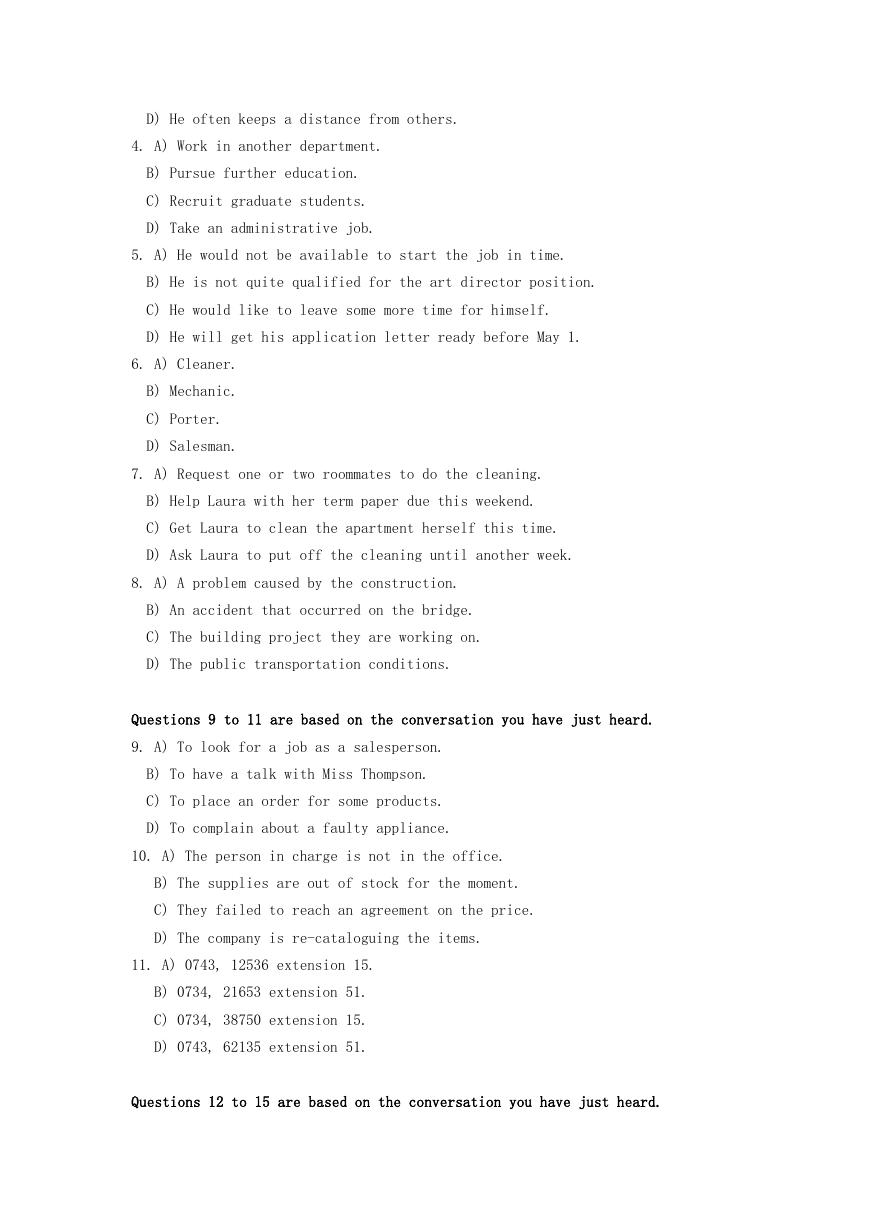
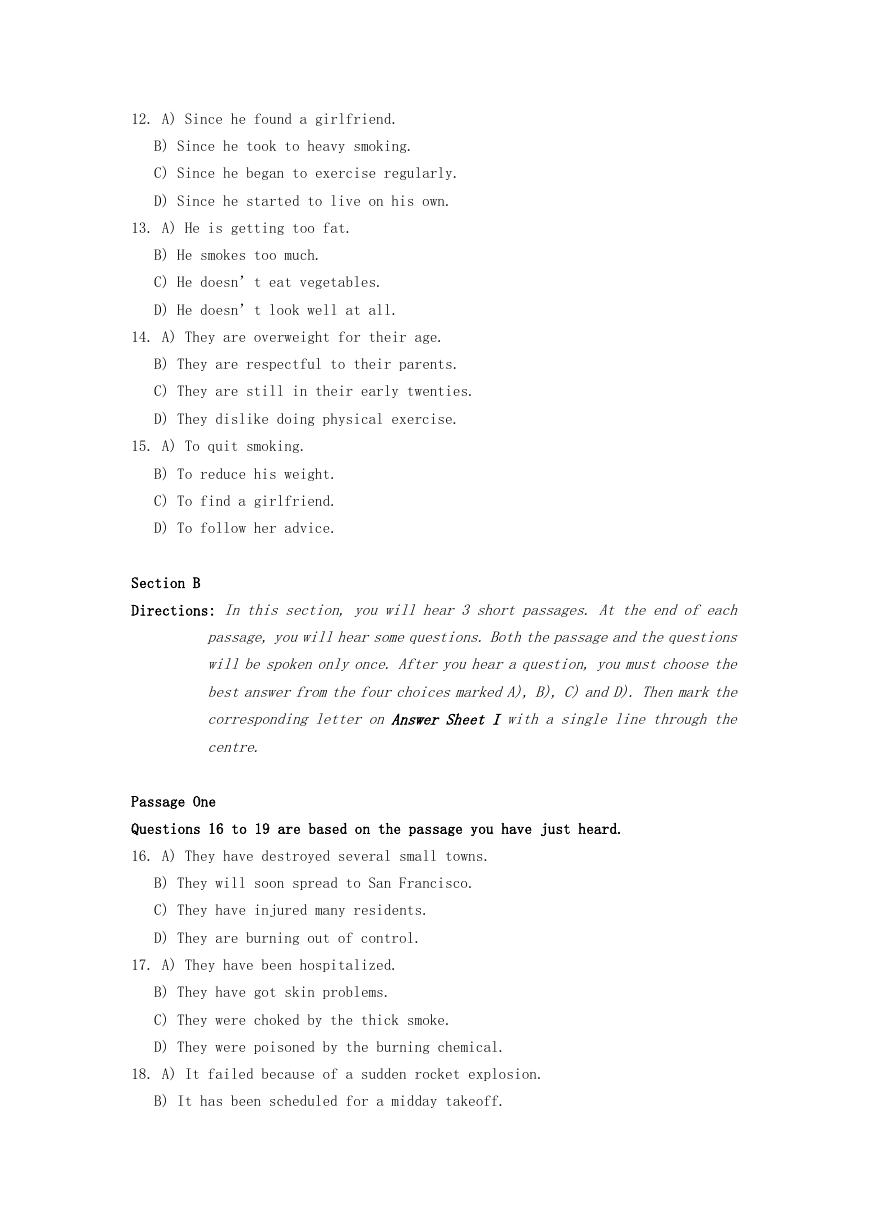
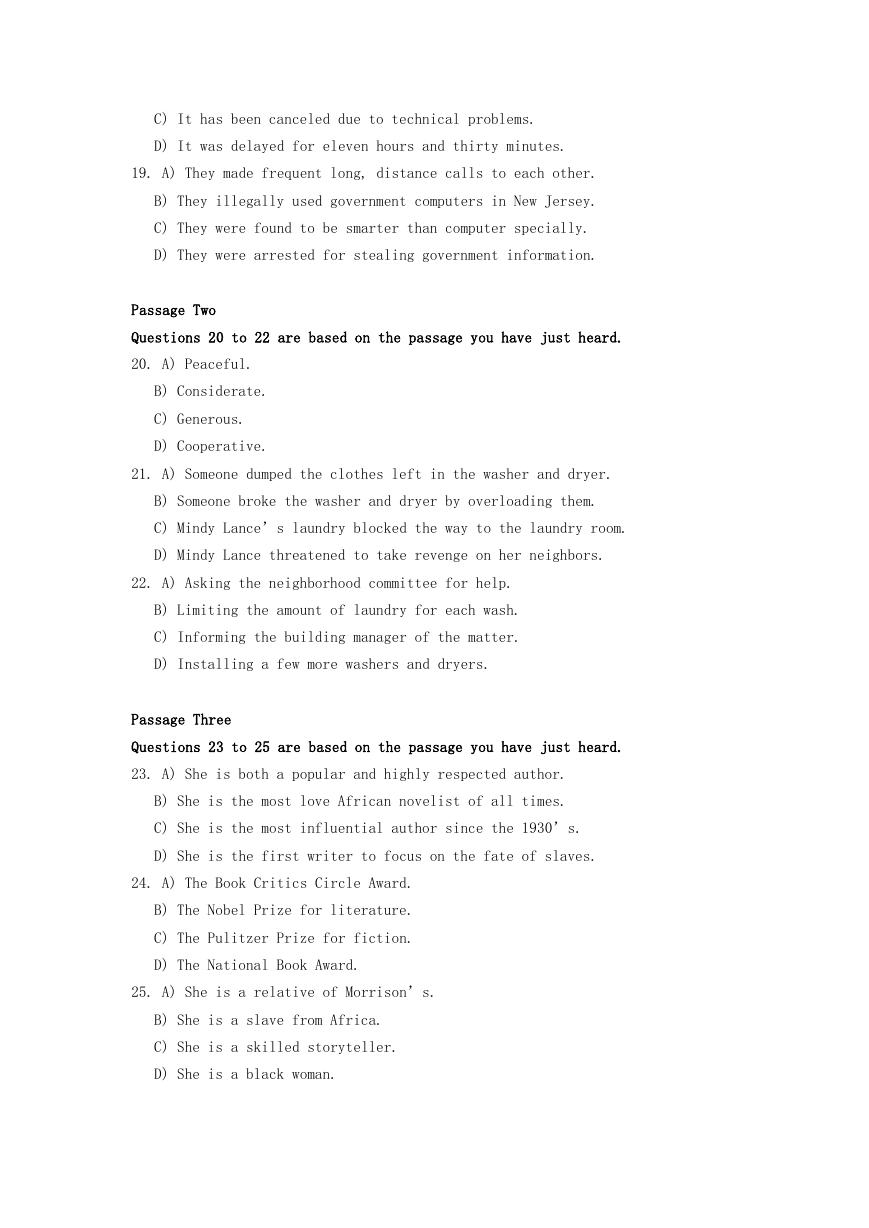
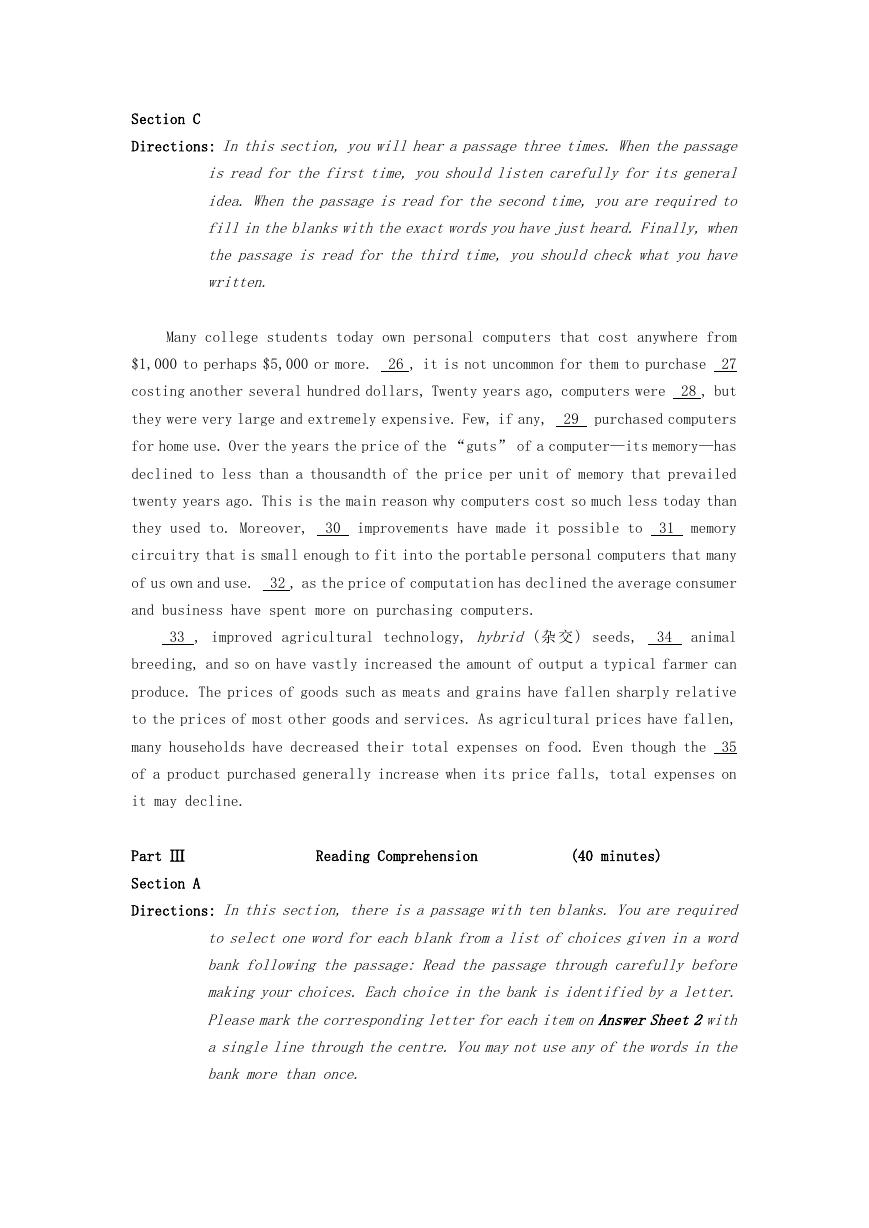

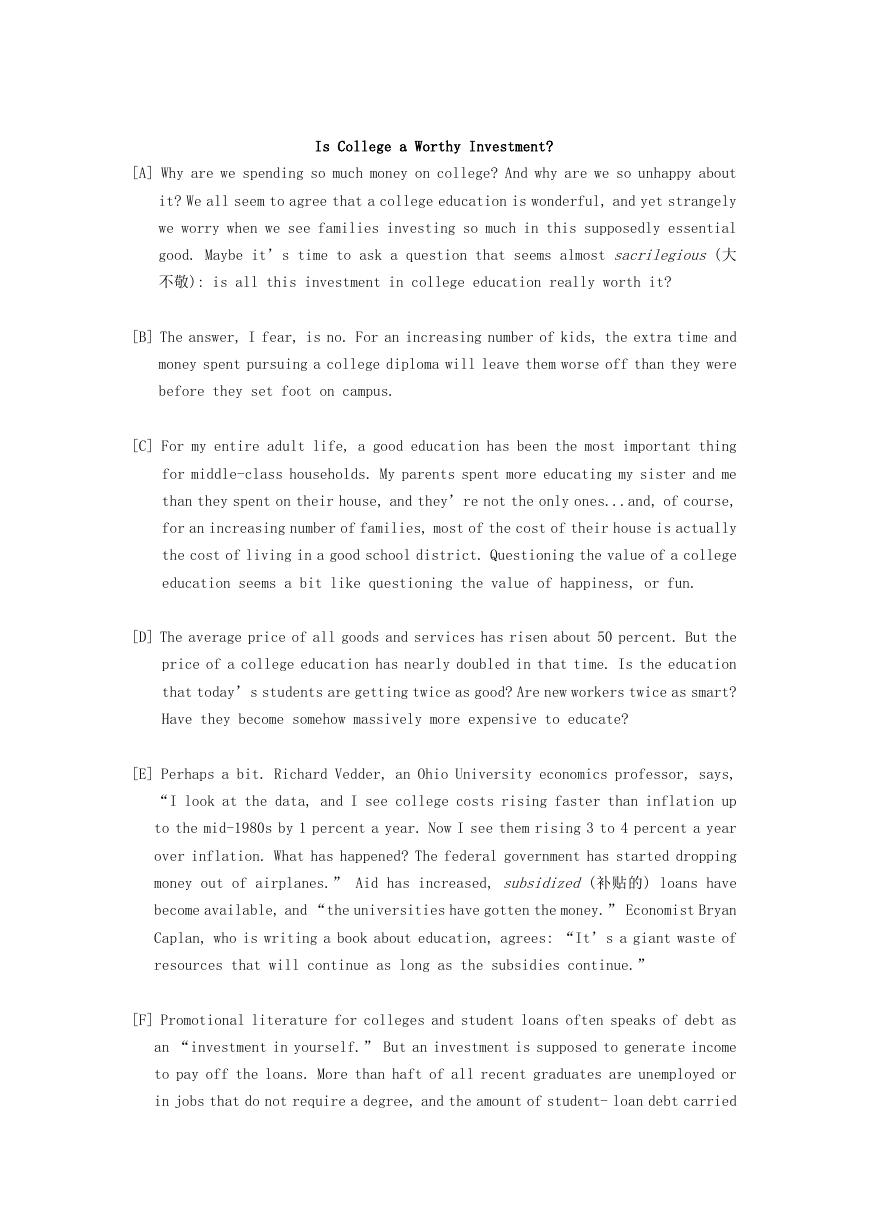









 2023年江西萍乡中考道德与法治真题及答案.doc
2023年江西萍乡中考道德与法治真题及答案.doc 2012年重庆南川中考生物真题及答案.doc
2012年重庆南川中考生物真题及答案.doc 2013年江西师范大学地理学综合及文艺理论基础考研真题.doc
2013年江西师范大学地理学综合及文艺理论基础考研真题.doc 2020年四川甘孜小升初语文真题及答案I卷.doc
2020年四川甘孜小升初语文真题及答案I卷.doc 2020年注册岩土工程师专业基础考试真题及答案.doc
2020年注册岩土工程师专业基础考试真题及答案.doc 2023-2024学年福建省厦门市九年级上学期数学月考试题及答案.doc
2023-2024学年福建省厦门市九年级上学期数学月考试题及答案.doc 2021-2022学年辽宁省沈阳市大东区九年级上学期语文期末试题及答案.doc
2021-2022学年辽宁省沈阳市大东区九年级上学期语文期末试题及答案.doc 2022-2023学年北京东城区初三第一学期物理期末试卷及答案.doc
2022-2023学年北京东城区初三第一学期物理期末试卷及答案.doc 2018上半年江西教师资格初中地理学科知识与教学能力真题及答案.doc
2018上半年江西教师资格初中地理学科知识与教学能力真题及答案.doc 2012年河北国家公务员申论考试真题及答案-省级.doc
2012年河北国家公务员申论考试真题及答案-省级.doc 2020-2021学年江苏省扬州市江都区邵樊片九年级上学期数学第一次质量检测试题及答案.doc
2020-2021学年江苏省扬州市江都区邵樊片九年级上学期数学第一次质量检测试题及答案.doc 2022下半年黑龙江教师资格证中学综合素质真题及答案.doc
2022下半年黑龙江教师资格证中学综合素质真题及答案.doc